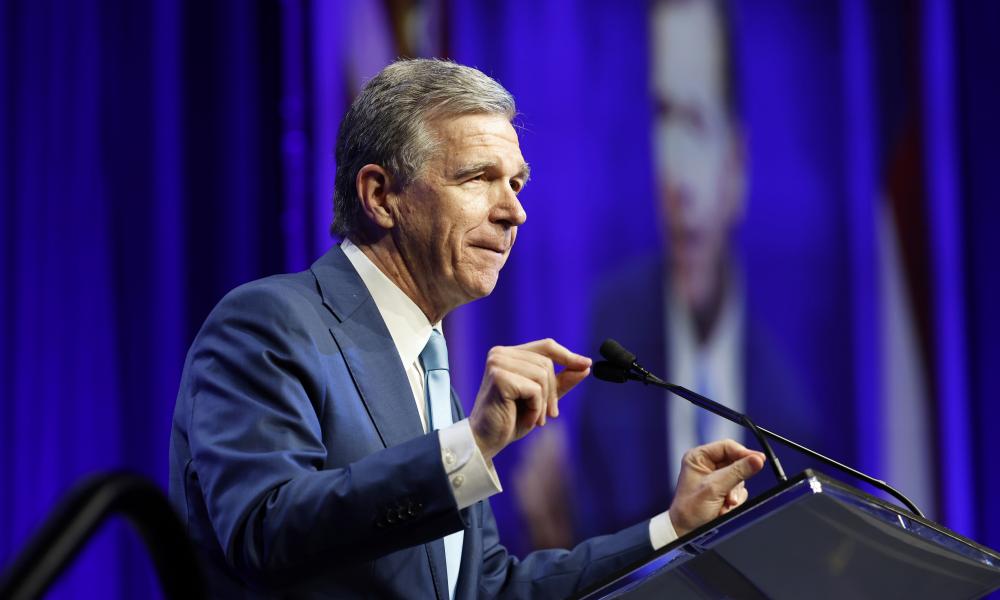The Democratic governor of North Carolina, Roy Cooper, withdrew from consideration for Kamala Harris’s vice-presidential pick in part because he feared his extremist Republican lieutenant governor could try to seize power – or at least the spotlight – in his absence.
“Mark Robinson, the Republican nominee for governor, is the most extreme statewide candidate in the country right now,” Cooper told Politico in an article published on Saturday, as Harris prepared to name her choice to take on Donald Trump and JD Vance. Harris’s decision is expected before a rally in Philadelphia on Tuesday.
“If I were to be out of state at a campaign event, if I had been the vice-presidential nominee, he could claim he was acting governor,” Cooper said.
Related: The culture war in North Carolina is playing out in the race for governor
Robinson is a polarising figure who has wielded pro-gun, anti-abortion, anti-LGBTQ+ and antisemitic rhetoric, including quoting the Nazi leader, Adolf Hitler, a choice he has defended.
Robinson is the first Black lieutenant governor of the battleground state, and if he beats Josh Stein, the Democratic nominee, he will become only the sixth Black governor anywhere in the US.
Invoking the memory of the Black civil rights leader, Trump has called Robinson “Martin Luther King on steroids”. So relations between governor and lieutenant governor have been unsurprisingly strained.
Robinson recently complained that Cooper “has had several chances to congratulate me on the accomplishment of being the first Black lieutenant governor, and he has never taken it”.
North Carolina is among states with constitutions that say if the governor is out of state, the lieutenant governor assumes power in an acting capacity. Furthermore, unlike in presidential race, the lieutenant governor is elected separately rather than on the same ticket as governor.
As Cooper said, when the first North Carolina constitution was adopted, in 1776, “you had no way to communicate”, so such measures “made sense”.
The constitution was last revised in 1971, by which time telephones had existed for nearly 100 years. But the acting governor provision stayed in.
Cooper told Politico: “There have been a few cases across the country that have said, ‘Look, now with text and phone and email and Zoom and ways to communicate, this doesn’t make sense’ … and courts have ruled that it doesn’t literally mean that.
“North Carolina courts have not ruled that, however, and fairly recently, Republicans have taken over the North Carolina supreme court. They have made some extremely partisan decisions here lately, particularly regarding voting and redistricting.”
Cooper noted that Robinson has already used the constitutional provision.
“I was on a recruiting trip to Japan,” Cooper said, of events last October. “He did claim he was acting governor. He did a big proclamation and press conference while I was gone. It was something about support for the state of Israel. It was obviously to make up for all of his antisemitic comments that he’d made, his denial of the Holocaust that he’d made over the years.
“… Our concern was that in this race for governor, he likes attention. He likes to get extremist contributions from all over the country. If I were to be out of state … he could claim he was acting governor.
“The attention he would get would be times 10, and it would be a distraction to the presidential campaign. And plus, we don’t know for sure what the Republican supreme court would decide.
“We believe we’ve got good arguments on the issue,” Cooper said, but “it was more that he would use this as a real distraction, drawing attention to himself, drawing attention away from the presidential campaign and that was part of the calculation that I looked at in making the decision” not to remain in consideration for vice-president.


